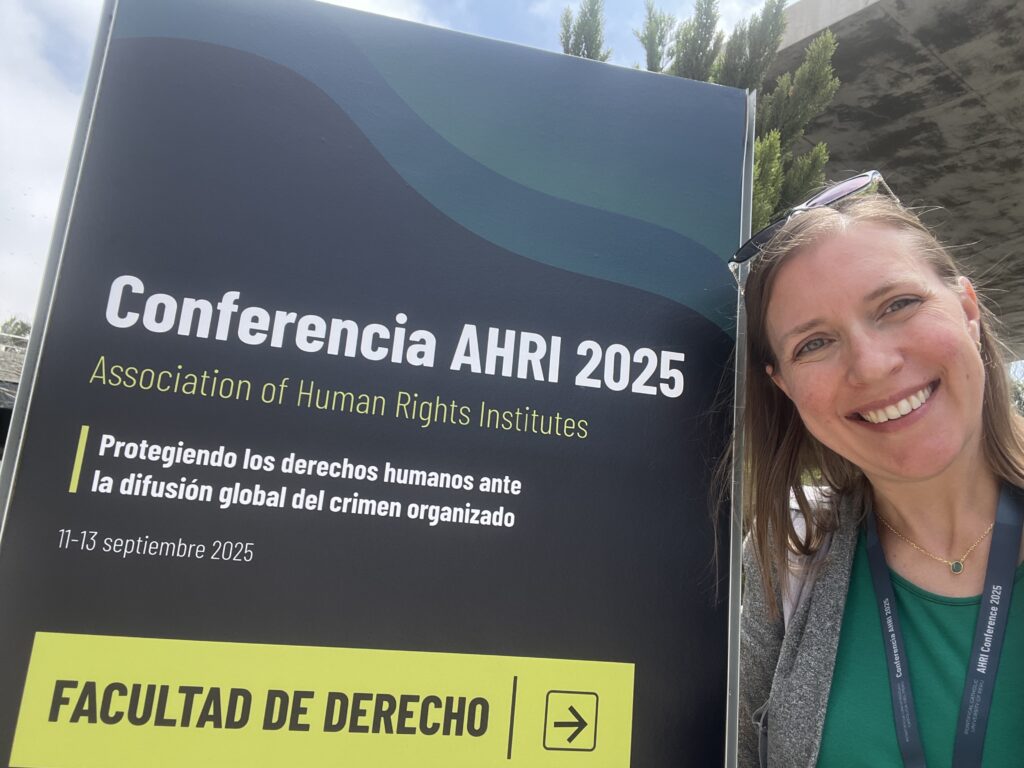CGLJ Participates in AHRI Annual Conference: “Protecting Human Rights from the Global Spread of Organized Crime”

CGLJ Legal Program Manager, Amy Van Zyl-Chavarro
Photo Credit: CGLJ
Northeastern Law’s Center for Global Law and Justice (CGLJ) has been accepted as a member of the Association of Human Rights Institutes (AHRI), joining a dynamic network of more than 80 institutes across over 35 countries dedicated to human rights research and education. The membership was formalized following CGLJ’s participation last month in AHRI’s 2025 conference, hosted in Peru by the Instituto de Democracia y Derechos Humanos at the Pontificia Universidad Católica del Peru. This year’s conference focused on “protecting human rights from the global spread of organized crime,” bringing together scholars and advocates from around the world to examine the complex impacts that transnational criminal networks are having on human rights, as well as on approaches to governance and justice throughout the world.
Organized crime is a sustained and coordinated enterprise, normally carried out by a group or network of individuals whose goal it is to “obtain, directly or indirectly, a financial or other material benefit” from illicit activities. U.N. Convention against Transnational Organized Crime, art. 2, Nov. 15, 2000, 2225 U.N.T.S. 209. Some common forms of organized crime include drug trafficking, human trafficking, smuggling of migrants, illegal trade of firearms, and other forms of black-market trading. See What is transnational organized crime?, U.N. Peace and Security (last visited Sept. 30. 2025). Very often these enterprises include a money laundering component meant to legitimize profits by concealing their illegal origins. See Id. While organized criminal groups frequently resort to corruption of public officials or the use of intimidation, threats, or force in order to protect or expand their operations, their main underlying motivation is an economic one. See E4J University Module Series: Organized Crime, Module 1, Similarities and differences between organized crime and other forms of crime, U.N. Office on Drugs and Crime (last visited Sept. 30, 2025).
As criminal enterprises like the Italian mafia and the Colombian drug cartels became increasingly more powerful and their transnational reach continued to expand, countries like the United States and Italy began campaigning in the 1990s for a more coordinated international approach to combating such groups. See Ian Tennant, The Promise of Palermo: A Political History of the UN Convention against Transnational Organized Crime 2-3 (2020). These efforts ultimately resulted in the adoption of the United Nations Convention against Transnational Organized Crime (UNTOC Treaty), which has been ratified by 194 countries, more countries than most other international treaties. See International Day for the Prevention of and Fight Against All Forms of Transnational Organized Crime, U.N., (last visited Sept. 30, 2025). The UNTOC Treaty provided a legal framework for countries to coordinate their use of domestic criminal law to penalize transnational organized crime, as well as agree on a shared framework of anti-laundering, anti-corruption, and criminal investigative and extradition measures. What the UNTOC Treaty failed to address were the human rights ramifications of organized crime.
A recurring theme throughout this year’s AHRI conference was how criminal organizations increasingly use violence to exert control over entire territories, over victims of trafficking, and over human rights defenders and journalists who dare to question their activities. For example, one panelist shared her research on the trauma left behind in communities that have undergone decades of such violence, and her findings that the trauma is transmitted from one generation to the next. Another panelist explained different ways in which criminal organizations come to exert control over entire communities and territories. Sometimes criminal networks fill the vacuum left where governments are failing to fulfill traditional functions related to caring for the needs of the population. Other times criminal networks take hold where governments have attempted to privatize some of their traditional functions. A third method that criminal organizations use to ensure their ability to operate is through corruption, by infiltrating different levels of government.
Another recurring theme of the conference was the different ways in which governments are adopting excessively punitive responses to organized crime, often indiscriminately criminalizing both perpetrators and victims. Multiple panels focused on the decisions of various governments to criminally charge migrants or victims of trafficking without considering their eligibility for refugee status or other forms of relief.
Sometimes governments also use declarations of emergency or designations of criminal groups as terrorist organizations to justify military action in place of regular law enforcement. Panelists also spoke about how these heavy-handed responses often result in arbitrary and abusive use of force, even against innocent civilians. In comments at the AHRI conference, the United Nations Special Rapporteur on counter-terrorism and human rights underlined the importance of distinguishing between organized crime and terrorism for determining the appropriate response under international law. He explained that while the ultimate goal of an organized criminal group is to make a financial profit, they are unlike terrorist organizations in that their objective is not political. Conversely, terrorist organizations by definition are driven by the desire to obtain a specific political objective through the use of force and terror. See S.C. Res. 1566, para. 3 (Oct. 8, 2004). A heightened (militarized) response to a terrorism threat is more easily justified under international law due to the existential threat that terrorist organizations pose to sovereign governments, but in the interest of safeguarding human rights, such responses must be reserved for a narrow category of situations.
At the end of the conference CGLJ and other AHRI members agreed to adopt a declaration calling for the international community to cooperate in updating the international normative framework for addressing the problem of organized crime in a way that is consistent with and directly takes into account international human rights law. A Spanish version of AHRI’s 2025 Lima Declaration has been made publicly available by the conference host, the Instituto de Democracia y Derechos Humanos at the at Pontificia Universidad Católica del Peru. An English version will also be available on AHRI’s webpage soon.